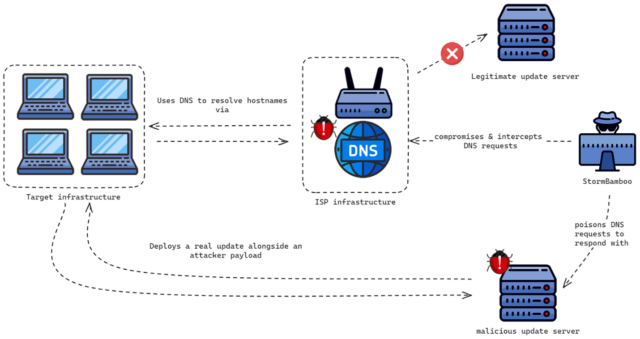
Hackers delivered malware to Home windows and Mac customers by compromising their Web service supplier after which tampering with software program updates delivered over unsecure connections, researchers stated.
The assault, researchers from safety agency Volexity stated, labored by hacking routers or comparable sorts of system infrastructure of an unnamed ISP. The attackers then used their management of the units to poison area identify system responses for legit hostnames offering updates for a minimum of six totally different apps written for Home windows or macOS. The apps affected had been the 5KPlayer, Fast Heal, Rainmeter, Partition Wizard, and people from Corel and Sogou.
These aren’t the replace servers you’re in search of
As a result of the replace mechanisms didn’t use TLS or cryptographic signatures to authenticate the connections or downloaded software program, the menace actors had been ready to make use of their management of the ISP infrastructure to efficiently carry out machine-in-the-middle (MitM) assaults that directed focused customers to hostile servers slightly than those operated by the affected software program makers. These redirections labored even when customers employed non-encrypted public DNS companies reminiscent of Google’s 8.8.8.8 or Cloudflare’s 1.1.1.1 slightly than the authoritative DNS server offered by the ISP.
“That’s the enjoyable/scary half—this was not the hack of the ISPs DNS servers,” Volexity CEO Steven Adair wrote in an internet interview. “This was a compromise of community infrastructure for Web site visitors. The DNS queries, for instance, would go to Google’s DNS servers destined for 8.8.8.8. The site visitors was being intercepted to answer the DNS queries with the IP tackle of the attacker’s servers.”
In different phrases, the DNS responses returned by any DNS server could be modified as soon as it reached the infrastructure of the hacked ISP. The one approach an finish consumer may have thwarted the assault was to make use of DNS over HTTPS or DNS over TLS to make sure lookup outcomes haven’t been tampered with or to keep away from all use of apps that ship unsigned updates over unencrypted connections.
Volexity offered the next diagram illustrating the move of the assault:

Volexity
For instance, the 5KPlayer app makes use of an unsecure HTTP connection slightly than an encrypted HTTPS one to test if an replace is on the market and, if that’s the case, to obtain a configuration file named Youtube.config. StormBamboo, the identify used within the trade to trace the hacking group accountable, used DNS poisoning to ship a malicious model of the Youtube.config file from a malicious server. This file, in flip, downloaded a next-stage payload that was disguised as a PNG picture. In actual fact, it was an executable file that put in malware tracked underneath the names MACMA for macOS units or POCOSTICK for Home windows units.
MACMA first got here to gentle in 2021 publish printed by Google’s Risk Evaluation Group, a workforce that tracks malware and cyberattacks backed by nation-states. The backdoor was written for macOS and iOS units and offered a full suite of capabilities together with system fingerprinting, display seize, file downloading and importing, execution of terminal instructions, audio recording, and keylogging.
POCOSTICK, in the meantime, has been in use since a minimum of 2014. Final 12 months, safety agency ESET stated the malware, which it tracked underneath the identify MGBot, was used solely by a Chinese language-speaking menace group tracked as Evasive Panda.
ESET researchers decided that the malware was put in by legit updates of benign software program, however they weren’t certain how that occurred. One chance, the researchers stated on the time, was by a supply-chain assault that changed the legit updates with malicious ones on the very supply. The opposite potential state of affairs was by a MitM assault on the servers delivering the updates. Volexity’s findings now affirm that the latter clarification is the right one.
In a minimum of one case in the latest assaults, StormBamboo pressured a macOS system to put in a browser plugin Volexity tracks underneath the identify RELOADEXT. The extension masquerades as one which masses webpages to be appropriate with Web Explorer. In actual fact, Volexity stated, it copies browser cookies and sends them to a Google Drive account managed by the attackers. The information was base64 encoded and encrypted utilizing the Superior Encryption Commonplace. Regardless of the care taken by the hackers, they nonetheless uncovered the client_id, client_secret, and refresh_token within the malicious extension.
One different method Volexity noticed was StormBamboo’s use of DNS poisoning to hijack www.msftconnecttest.com , a site Microsoft makes use of to find out if Home windows units are actively linked to the Web. By changing the legit DNS decision with an IP tackle pointing to a malicious web site operated by the menace actors, they may intercept HTTP requests destined for any host.
Adair declined to establish the hacked ISP apart from to say it’s “not an enormous large one or one you’d probably know.”
“In our case the incident is contained however we see different servers which can be actively serving malicious updates however we have no idea the place they’re being served from,” he stated. “We suspect there are different energetic assaults world wide we don’t have purview into. This may very well be from an ISP compromise or a localized compromise to a company reminiscent of on their firewall.”
As famous earlier, there are numerous choices for stopping these kinds of assaults past (1) eschewing all software program that updates unsecurely or (2) utilizing DNS over HTTPS or DNS over TLS. The primary methodology is probably going the perfect, though it probably means having to cease utilizing a most popular app in a minimum of some circumstances. The choice DNS configurations are viable, however in the intervening time are provided by solely a handful of DNS suppliers, with 8.8.8.8 and 1.1.1.1 being the perfect recognized.